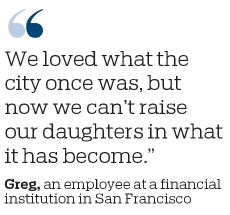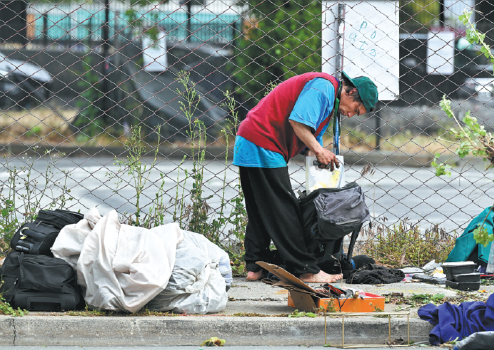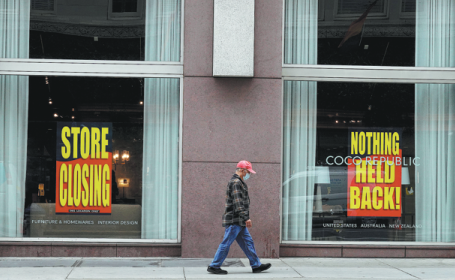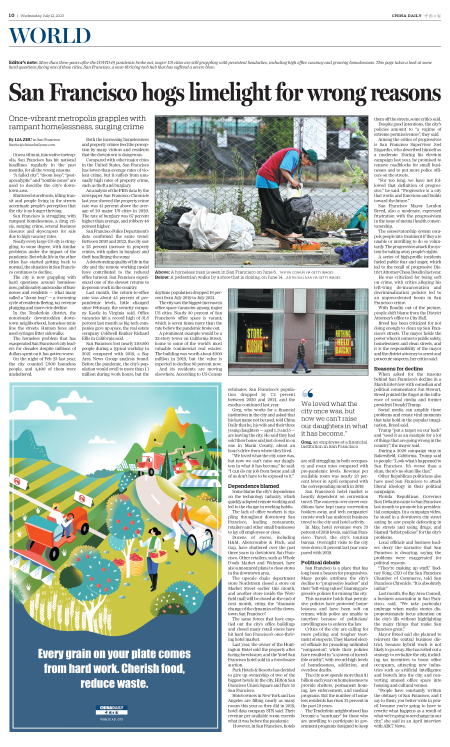

A homeless man is seen in San Francisco on June 6.

A pedestrian walks by a store that is closing, on June 14.
Editor's note: More than three years after the COVID-19 pandemic broke out, major US cities are still grappling with persistent headaches, including high office vacancy and growing homelessness. This page takes a look at some hard questions facing one of these cities, San Francisco, a once-thriving tech hub that has suffered a severe blow.
Once a vibrant, innovative metropolis, San Francisco has hit national headlines regularly in the past months, for all the wrong reasons.
"A failed city", "doom loop", "post-apocalyptic" and "zombie zones" are used to describe the city's downtown area.
Shuttered storefronts, idling transit and people living in the streets accentuate people's perception that the city is no longer thriving.
San Francisco is struggling with rampant homelessness, a drug crisis, surging crime, several business closures and skyscrapers for sale due to high vacancy rates.
Nearly every large US city is struggling, to some degree, with similar problems under the impact of the pandemic. But while life in the other cities has started getting back to normal, the situation in San Francisco continues to decline.
The city is now grappling with hard questions around homelessness, public safety and exodus of businesses and residents — what many called a "doom loop" — a worsening cycle of residents fleeing, tax revenue plunging and more civic decline.
In the Tenderloin district, the notoriously downtrodden downtown neighborhood, homeless tents line the streets. Human feces and used syringes litter sidewalks.
The homeless problem that has exasperated San Francisco's city leaders for decades despite millions of dollars spent on it has gotten worse.
On the night of Feb 23 last year, the city counted 7,800 homeless people, and 4,400 of them were unsheltered.
Both the increasing homelessness and property crimes feed the perception by many visitors and residents that the downtown is dangerous.
Compared with other major cities in the United States, San Francisco has lower-than-average rates of violent crime, but it suffers from unusually high rates of property crime, such as theft and burglary.
An analysis of the FBI's data by the newspaper San Francisco Chronicle last year showed the property crime rate was 41 percent above the average of 20 major US cities in 2020. The rate of burglary was 67 percent higher than average, and robbery 48 percent higher.
San Francisco Police Department's data confirmed the same trend: Between 2020 and 2022, the city saw a 23 percent increase in property crimes, with spikes in burglary and theft headlining the surge.
A deteriorating quality of life in the city and the remote working model have contributed to the reduced office turnout. San Francisco experienced one of the slowest returns to in-person work in the country.
Last month, the return-to-office rate was about 45 percent of pre-pandemic levels, little changed since February, the security company Kastle in Virginia said. Office vacancies hit a record high of 31.8 percent last month as big tech companies gave up space, the real estate company Coldwell Banker Richard Ellis in California said.
San Francisco lost nearly 210,000 people during a typical workday in 2021 compared with 2019, a Bay Area News Group analysis found. Before the pandemic, the city's population would swell to more than 1.1 million during work hours, but the daytime population dropped 18 percent from July 2019 to July 2021.
The city saw the biggest increase in office space vacancies among major US cities. Nearly 30 percent of San Francisco's office space is vacant, which is seven times more than the rate before the pandemic broke out.
A prominent example would be a 22-story tower on California Street, home to some of the world's most valuable commercial real estates. The building was worth about $300 million in 2019, but the value is expected to decline 80 percent now.
And its residents are moving elsewhere. According to US Census estimates, San Francisco's population dropped by 7.2 percent between 2020 and 2021, and the exodus continued last year.
Greg, who works for a financial institution in the city and asked that his last name not be used, told China Daily that he, his wife and their three young daughters — aged 1, 3 and 5-are leaving the city. He said they had sold their house and just closed in on one in Marin County, about an hour's drive from where they lived.
"We loved what the city once was, but now we can't raise our daughters in what it has become," he said. "I can do my job from home and all of us don't have to be exposed to it."
Dependence blamed
Some blame the city's dependence on the technology industry, which quickly adopted remote working and led to the change in working habits.
The lack of office workers is rippling throughout downtown San Francisco, leading restaurants, retailers and other small businesses to lay off employees or close.
Dozens of stores, including H&M, Abercrombie & Fitch, and Gap, have shuttered over the past three years in downtown San Francisco. Other retailers, such as Whole Foods Market and Walmart, have also announced plans to close stores in the downtown area.
The upscale chain department store Nordstrom closed a store on Market Street earlier this month, and another store inside the Westfield mall will be closed at the end of next month, citing the "dramatic change of the dynamics of the downtown San Francisco".
The same forces that have emptied out the city's office buildings and closed many retail stores have hit hard San Francisco's once-thriving hotel market.
Last year, the owner of the Huntington Hotel sold the property after facing foreclosure, and the Yotel San Francisco hotel sold in a foreclosure auction.
Park Hotels& Resorts has decided to give up ownership of two of the biggest hotels in the city, Hilton San Francisco Union Square and Parc 55 San Francisco.
Hotel owners in New York and Los Angeles are filling nearly as many rooms this year as they did in 2019, hotel data company STR said. Their revenue per available room exceeds what it was before the pandemic.
However, in San Francisco, hotels are still struggling in both occupancy and room rates compared with pre-pandemic levels. Revenue per available room was nearly 23 percent lower in April compared with the corresponding month in 2019.
San Francisco's hotel market is heavily dependent on convention travel. The concerns over street conditions have kept many convention bookers away, and tech companies' remote work has undercut business travel to the city and hotel activity.
In May, hotel revenues were 73 percent of 2019 levels, said San Francisco Travel, the city's tourism bureau. Overnight visits to the city were down 31 percent last year compared with 2019.
Political debate
San Francisco is a place that has long been a beacon for progressives. Many people attribute the city's decline to "progressive leaders" and their "left-wing values", blaming progressive policies for ruining the city.
This narrative holds that permissive policies have protected homelessness and have been soft on crimes, while police are unable to interfere because of politicians' unwillingness to enforce the law.
Critics of the city are calling for more policing and tougher treatment of suspects. They blasted elected officials for preaching unlimited "compassion", while their policies have resulted in "a system of incredible cruelty", with record-high levels of homelessness, addiction, and overdose deaths.
The city now spends more than $1 billion each year on homelessness to provide shelters, permanent housing, law enforcement, and medical programs. But the number of homeless residents has risen 32 percent in the past 10 years.
The Tenderloin neighborhood has become a "sanctuary" for those who are unwilling to participate in government programs designed to keep them off the streets, some critics said.
Despite good intentions, the city's policies amount to "a regime of extreme permissiveness", they said.
Among the critics of progressives is San Francisco Supervisor Joel Engardio, who described himself as a moderate. During his election campaign last year, he promised to remove roadblocks for small businesses and to put more police officers on the streets.
"For too long, we have not followed that definition of progressive," he said. "Progressive is a city that works and functions and builds toward the future."
San Francisco Mayor London Breed, also a moderate, expressed frustration with the progressivism in the issue of mental health conservatorship.
The conservatorship system compels people into treatment if they are unable or unwilling to do so voluntarily. The progressives attack the system for taking away people's rights.
A series of high-profile incidents fueled public fear and anger, which led to the recall of progressive District Attorney Chesa Boudin last year.
He was criticized for being soft on crime, with critics alleging his left-wing de-incarceration and decriminalization policies led to an unprecedented boom in San Francisco crime.
With Boudin out of the picture, people shift blame from the District Attorney's office to City Hall.
Breed has been criticized for not doing enough to clean up San Francisco's streets. The mayor holds the power when it comes to public safety, homelessness and clean streets, and it is the responsibility of the mayor and the district attorney to arrest and prosecute suspects, her critics said.
Reasons for decline
When asked for the reasons behind San Francisco's decline in a March interview with comedian and political commentator Jon Stewart, Breed pointed the finger at the influence of social media and former president Donald Trump.
Social media can amplify those problems and create viral moments that take hold in the popular imagination, Breed said.
Trump "put a target on our back" and "used it as an example for a lot of things that are going wrong in the country", the mayor said.
During a 2020 campaign stop in Bakersfield, California, Trump said to people: "Look what's happened to San Francisco. It's worse than a slum, there's no slum like that."
Other Republican politicians also have used San Francisco to attack liberal ideology in their political campaigns.
Florida Republican Governor Ron DeSantis came to San Francisco last month to promote his presidential campaign. In a campaign video, he stood in a downtown city street saying he saw people defecating in the streets and using drugs, and blamed "leftist policies" for the city's problems.
Local officials and business leaders decry the narrative that San Francisco is decaying, saying the problems were exaggerated for political reasons.
"They're making up stuff," Rodney Fong, CEO of the San Francisco Chamber of Commerce, told San Francisco Chronicle. "It is absolutely unfair."
Last month, the Bay Area Council, a business association in San Francisco, said, "We take particular umbrage when media stories disproportionately focus attention on the city's ills without highlighting the many things that make San Francisco great."
Mayor Breed said she planned to reinvent the central business district, because hybrid work is not likely to go away. She has rolled out a strategy to revitalize the city, including tax incentives to boost office occupancy, attracting new industries such as artificial intelligence and biotech into the city, and converting unused office space into housing and cultural venues.
"People have constantly written the obituary of San Francisco, and I say to them, you better write in pencil because you're going to have to rewrite what happens as a result of what we're going to see change in our city," she said in an April interview with ABC7 News.
liazhu@chinadailyusa.com

